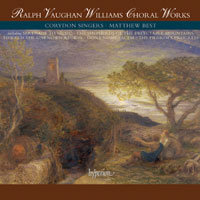|
Vaughan William – Choral Works 
Serenade to Music; Toward the Unknown Region; The Shepherds of the Delectable Mountains; A Song of Thanksgiving; Dona nobis pacem; The Pigrim’s Progress; Five Mystical Songs; Fantasia on Christmas Carols; Lord, Thou hast been our refuge; Three Choral Hymns; Magnificat; The Hundredth Psalm; Flos Campi; Four hymns for tenor, viola and strings; O Clap your hands
John Mark Ainsley; Thomas Allen; Jonathan Best; John Bowen; Elizabeth Connell;
John Connell; Arthur Davies; Maldwyn Davies; Anne Dawson; Lynne Dawson;
John Gielgus; Martyn Hill; Judith Howarth; Gwynne Howell; Ursula Howellls;
Nobuko Imai; Roger Judd; Linda Kitchen; The London Oratory Junior Choir;
Diana Montague; Aidan Oliver; Alan Opie; Richard Pasco; Jean Rigby;
Amanda Roocroft; John Scott; Matthew Souter; Bryn Terfel; Adrian Thompson;
Sarah Walker; Catherine Wyn-Rogers
Corydon Singers; English Chamber Orchestra; Corydon Orchestra;
City of London Sinfonia/Matthew Best
Hyperion – CDS44321/4 [1990-93 – 4 CDs – 4 hrs 41 mins]
Hyperion have chosen to mark the 50th anniversary of Ralph Vaughan Williams’ death with the boxed reissue of four CDs of his music for voice and orchestra, all recorded during the early 1990s.
Ralph Vaughan Williams was a particularly prolific composer for voice. His output spans more than 50 years. A proportionately small selection must, of necessity, beg the question “a glass half full, or a glass half empty?”
Let’s be optimistic. Vaughan Williams’ life long pilgrimage in the steps of Bunyan receives lavish attention with the inclusion of both his operatic scena The Shepherds of the Delectable Mountains, dating from 1921-22, and The Pilgrim’s Progress – A Bunyan Sequence, given in Christopher Palmer’s adaptation of the 1942 radio version.
The first of these is a delectable theatrical idyll given a strong performance with Bryn Terfel as Pilgrim and John Mark Ainsley as the Celestial Messenger, to name just two of an excellent cast.
The second is a more difficult work. Scored for three speakers, treble solo, chorus and orchestra, with obvious appeal for Bunyan enthusiasts, but not all listeners will welcome the substantial sequences of spoken dialogue between the musical sections.
Next there is the opportunity for comparison between Vaughan Williams’ impassioned plea for peace, Dona nobis pacem, written on the verge of World War II, and his arguably less successful Song of Thanksgiving following the cessation of hostilities.
The composer’s wonderful lyricism and unmatched ability to spin a radiantly hued arch of sound is demonstrated by both Flos Campi for viola (Nobuko Imai), wordless chorus and orchestra, and the celebrated Serenade to Music. For the Serenade, Hyperion lined up an impressive list of soloists in a performance which has been one of the best sellers in their catalogue.
Perhaps finest of all are two smaller pieces dating from 1911-12: the Five Mystical Songs for baritone and orchestra and the Four Hymns for tenor, viola and strings. The solo voices are respectively those of Thomas Allen and John Mark Ainsley, two singers with total respect for the poet’s words and in peak vocal shape – their performances are breathtakingly beautiful.
On the reverse “half empty” tally, Vaughan Williams’ significant folk song repertoire is left unexplored and the last 15 years of his life are represented only by his Coronation setting of The Hundredth Psalm. I longed for his Three Shakespeare Songs (1951) or perhaps his Christmas cantata Hodie (1953-54), but with more than half of the anniversary year still to come, my hopes may yet be fulfilled...
Serena Fenwick
|

